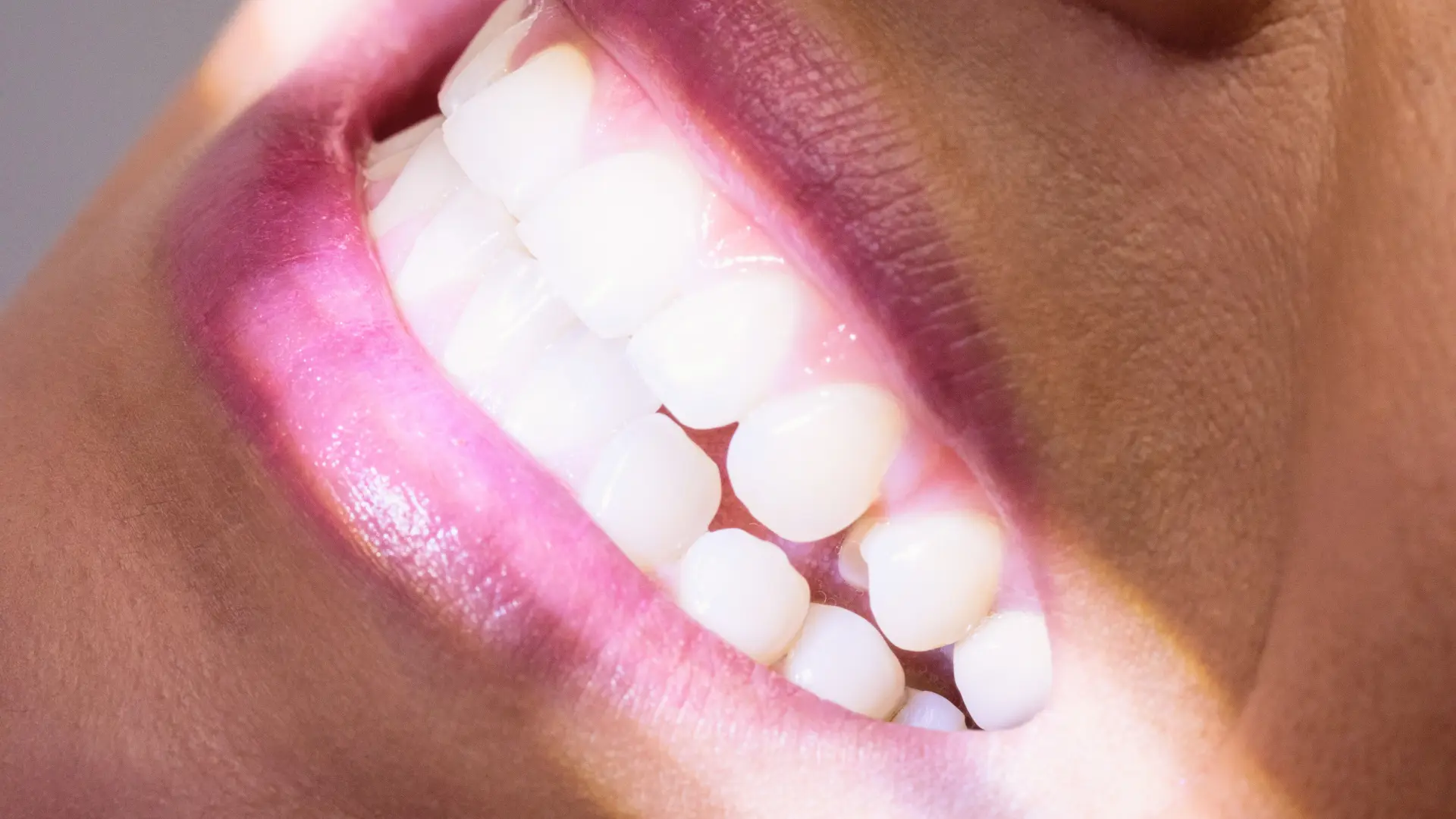Teeth Whitening (Bleaching)
- Home
- Treatments
- Teeth Whitening (Bleaching)
Teeth whitening (bleaching) treatment is a procedure applied to lighten the color of the teeth to give them a whiter and more aesthetic appearance.
Call our Hotline!
Teeth whitening (bleaching) treatment is a cosmetic dentistry procedure used to lighten the color of teeth to achieve a more aesthetic appearance. This procedure uses chemical agents to remove stains and discoloration from the surface of the teeth

What is Teeth Whitening (Bleaching)?
Teeth can turn yellow over time due to genetic factors, dietary habits, external factors such as smoking or aging. Teeth whitening can be applied to healthy teeth and can be performed both by a dentist in a clinical setting and personally at home.
The most common teeth whitening methods are office and home whitening. In-office whitening is a method applied by the dentist in the clinic and usually gives faster results. In this method, a whitening gel is applied to the teeth and supported by a special light. Home whitening, on the other hand, is done with customized trays and gels recommended by the dentist. These trays are placed on the teeth and should be used for a certain period of time. It is stated that both methods are effective, but which method to choose depends on the current condition of the teeth and the patient's preferences.
Why is Bleaching Done?
Teeth whitening is done to lighten the color of teeth for various reasons. Here are the reasons for teeth whitening in items:
- Aesthetic Concerns: White teeth offer a healthier and more attractive appearance. For this reason, many people prefer to whiten their teeth for a more aesthetically pleasing smile.
- Increased Self-Confidence: Teeth whitening boosts an individual's self-confidence. Whiter teeth leave a more positive impression in social interactions and help people feel better about themselves.
- Removing the Effects of Aging: The yellowing and staining that naturally occurs on teeth over time is part of the aging process. Teeth whitening helps to reverse these effects.
- Special Events: Teeth whitening can be preferred to get a better appearance on special occasions such as weddings, graduations or job interviews.
- Removal of Tooth Discoloration: Stains on teeth caused by the consumption of substances such as coffee, tea and cigarettes can be removed by whitening. In addition, some medications and health problems can also affect the color of the teeth.
- First Impression: People attach great importance to smiling as a first impression. White teeth create a more favorable first impression and provide an advantage in social relationships.
- Improving Dental Health: Teeth whitening can also improve overall oral health by removing stains and plaque from the surface of the teeth.
For these reasons, teeth whitening has become an important choice for many people, both aesthetically and psychologically.
Benefits of Teeth Whitening Treatment
Teeth whitening offers many benefits both aesthetically and psychologically. Here are the detailed benefits of teeth whitening:
- Enhanced Aesthetic Appearance: White teeth provide a healthier and more attractive smile. Teeth whitening improves the overall appearance by lightening the color of the teeth and helps individuals look younger.
- Increased Self-Confidence: Teeth whitening boosts an individual's self-confidence. Most people find that whiter teeth make a more favorable impression in social interactions. This creates a better first impression during job interviews or social events.
- Improvement in Social Relationships: White teeth make people more attractive. Studies show that people with white teeth are perceived as more sociable, friendly and intelligent. This increases social opportunities.
- Long Term Results: Teeth whitening, when done correctly, provides long-lasting results. Whitening can last for several months or even several years, making it an economical option.
- Fast and Effective Implementation: Teeth whitening is usually completed in a short time. While office whitening methods usually give results within an hour, home methods can give effective results within a few days.
- Painless and Minimal Preparation: Teeth whitening is usually painless and requires minimal preparation. This makes the procedure more accessible.
- Improving Dental Health: Teeth whitening can improve overall oral health by removing stains and plaque from the surface of the teeth. This contributes to healthier looking teeth.
- A Younger Look: White teeth hide the signs of aging and make individuals look younger. The darkening of teeth over time is part of the aging process and whitening can reverse this.
- Low Risk Transaction: Teeth whitening is usually a low-risk procedure. However, some people may experience side effects such as sensitivity. Therefore, it is recommended to be performed under the supervision of a dentist.
Teeth whitening is an important cosmetic dentistry procedure that improves the quality of life of individuals with its aesthetic and psychological benefits. However, since each individual's tooth structure is different, it is important to consult a dentist before teeth whitening.

How is Bleaching Done?
Teeth whitening treatment is a procedure to lighten the color of teeth and remove stains. Here is a step-by-step guide explaining how teeth whitening treatment is done:
Preliminary Evaluation
Choosing the Whitening Method
Home Bleaching: Your dentist will prepare a special whitening tray for you. Whitening gel is placed in this tray and applied to the teeth for a certain period of time.
Combined Method: First, whitening is done in the clinic and then continued at home. This method provides fast results and permanence.
Whitening Process
Aftercare
Teeth whitening treatment is an effective and safe method when done correctly. However, since each individual's tooth structure is different, it is important to adopt a personalized approach.
Who Should Have Teeth Whitening?
Teeth whitening is recommended for individuals who meet certain criteria. Here are the people who should have teeth whitening and the eligibility criteria:
- People with Healthy Teeth and Gums: Teeth whitening is suitable for individuals without tooth decay or gum disease. Such health problems can increase the risk of pain and sensitivity during the procedure.
- People with Yellow or Brown Stains: People with yellow or brown stains on their teeth can achieve more noticeable results with whitening. Especially stains caused by external factors (such as coffee, tea, smoking) can be effectively removed with whitening.
- Those with Realistic Expectations: It is important that those who apply for teeth whitening have realistic expectations about the results. The color of the teeth and the depth of the stains are factors that affect the results.
- Individuals 18 years of age and over: Generally, teeth whitening is recommended for individuals aged 18 and over. Since the teeth of children and young people are still in the developmental stage, it is recommended to avoid such procedures.
- Those Without Dental Restorations: Teeth whitening is not suitable for individuals with restorations such as fillings, crowns or bridges. These restorations are not affected by bleaching agents and color differences may occur as a result.
- Non-Smokers and Non-Alcohol Consumers: After the teeth whitening process, it is recommended to avoid habits that cause teeth staining such as smoking and alcohol. These habits can reduce the effect of the whitening process.
- Not Pregnant or Breastfeeding: Teeth whitening is not recommended for pregnant or breastfeeding women. Dental health may change during this period and whitening can lead to complications.
Teeth whitening offers an effective aesthetic solution for individuals who meet the above-mentioned criteria. However, since each individual's situation is different, it is important to consult with the dentist and assess personal health status.
Who Should Not Have Teeth Whitening Treatment?
Teeth whitening treatment is not a suitable option for everyone. Below are the main groups of people who should not have teeth whitening and the reasons why:
- People with Tooth Decay: Individuals with tooth decay should not have teeth whitening. Caries can increase the risk of pain and sensitivity during whitening.
- Individuals under 16 years of age: Teeth whitening is generally not recommended for children and teenagers under the age of 16. The teeth of individuals in this age group are still in the developmental stage and whitening can cause permanent damage to the teeth.
- Pregnant and Nursing Mothers: Teeth whitening is not recommended for pregnant or breastfeeding women. Since the effects of whitening agents used during this period are not fully known, it is important to avoid possible side effects after treatment.
- People with Extreme Tooth Sensitivity: Individuals with hypersensitivity in their teeth may feel discomfort during the whitening process. For this reason, dentists do not recommend whitening for patients with this condition.
- People with Gum Problems: Individuals with gum disease or inflammation should not undergo whitening. Bleaching agents can damage inflamed gums and worsen the condition.
- People with Deep Cracks in Their Teeth: Whitening is not suitable for individuals with deep cracks or structural problems in their teeth. Such conditions can cause more problems during whitening.
- Peroxide Allergy: Teeth whitening procedures usually use bleaching agents such as hydrogen peroxide or carbamide peroxide. Individuals who are allergic to these substances may experience adverse reactions during treatment.
Teeth whitening is not recommended for individuals with the conditions mentioned above. Before any dental treatment, it is important to discuss personal health with the dentist.
Frequently Asked Questions About Bleaching
We have also answered some of the frequently asked questions about the bleaching process in detail for you. If you have different questions you are curious about, do not hesitate to ask us.
How Long Does Teeth Whitening Take?
Is Teeth Whitening Permanent?
Does Teeth Whitening Damage Teeth?
When Are Results Visible After Teeth Whitening?
Why Choose Us?
About the Clinic
Do you have dental problems? Contact us now!
Clinic Address
Contact Information
+90 533 397 65 56

